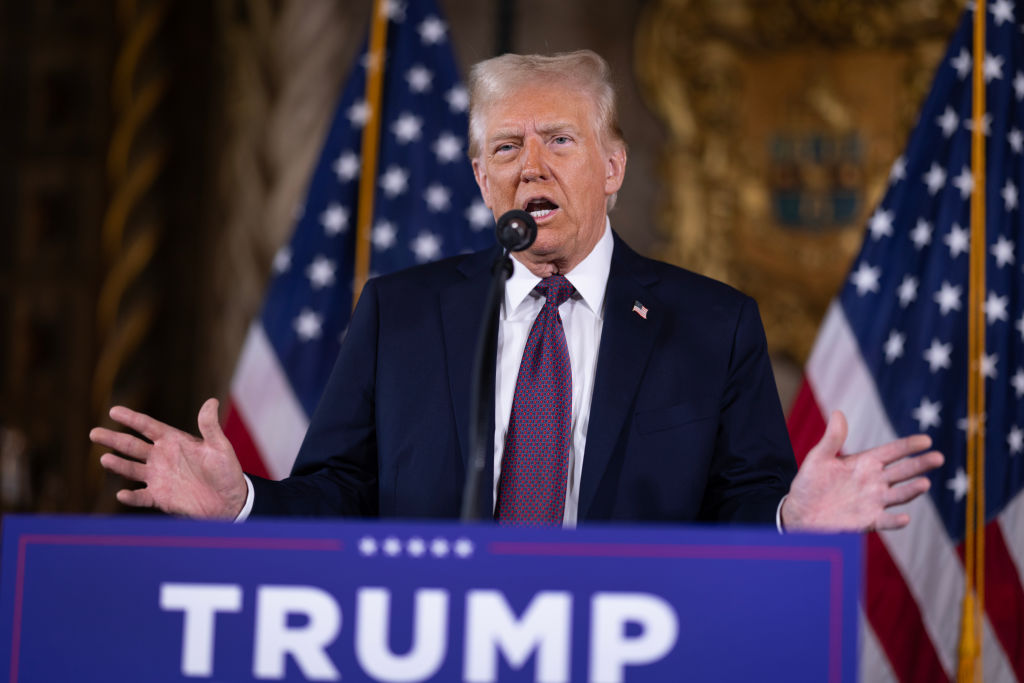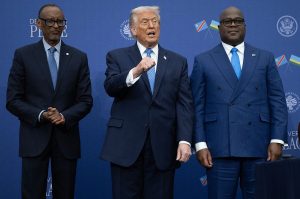Donald Trump didn’t just win an election last year, he performed an exorcism. He cast out spirits that have directed Western politics for a generation, not least the ghosts of Bill Clinton and Tony Blair. Those particular left-liberal leaders haven’t been in power for many years, of course. But the style of politics they pioneered on both sides of the Atlantic didn’t end with their terms as president or prime minister. The world before Trump was still very much the world that Clinton and Blair had made.
For decades Republicans and Conservatives found themselves having to accept the terms of what might be called the Clinton Blair settlement. Trump’s victory in 2016, along with the Brexit vote that year, gave the settlement a shock, but didn’t shatter it: the long road to getting Brexit implemented had a parallel in the refusal of America’s political establishment and opinion-molding classes to accept Trump’s legitimacy (and their own obsolescence).
The formula devised by Clinton and Blair in the 1990s had a long run. In the 1980s, the right thought it had a winning combination of ideas — free-market economics was ascendant, tough-on-crime policies were popular, as was support for the military, and most of the public still endorsed traditional morality over progressive sexual attitudes. But in the 1990s the politics of Clinton and Blair beat the earlier Reagan-Thatcher approach. Free-market economics became a component of globalism and a complement to progressive cultural efforts to “de-center” the West. Much the same was true of Western military power, which, after the Cold War, was emphasized by Clinton and then Blair as a means to promote progressive values and human rights. Falling crime rates meanwhile undercut the appeal of tough-on-crime conservatism, as ceaseless efforts in the media, law and electoral politics advanced same-sex marriage.
The Iraq War disgraced Tony Blair but didn’t put an end to Blairism, which simply leapt into new Tory host-bodies, starting with David Cameron’s. George W. Bush and his Republican Party publicly opposed same-sex marriage — as, for that matter, did Barack Obama — but elite Republicans had little enthusiasm for the fight, even if the party’s evangelical voters did. Bush Republicans, Clinton Democrats, New Labour and hip Conservatives shared a commitment to the outlines of the post-Cold War domestic and international arrangements that President Clinton had worked out. The West would pursue free trade, NATO expansion and wars to promote democracy; it would favor large-scale immigration for economic reasons and denounce strong opposition to immigration as necessarily racist; and the center-right would gently concede the battle over same-sex marriage and agree not to cause too much trouble over abortion.
Within that consensus, all the parties had to fight over were questions of administrative competence, tax rates relative to government benefits, and who was more antiracist, feminist (pity Mitt and his “binders full of women”) and tolerant overall. The center of political gravity was on the left, even when parties historically on the right were in office. Liberalism was not only the end of history, it had always been the telos toward which conservatism was aiming.
Trump transformed the American right beginning with his first campaign for president. But now he has overturned the left as well by wrecking the viability of the Clinton formula. Instead of downplaying immigration, as Republicans since George W. Bush had done for fear of being branded racist, Trump made securing the border and even mass deportations central to his 2024 campaign. He coupled immigration with crime to great electoral effect, overwhelming the elite economic discourse in favor of immigration. Just as Clinton reframed military questions as about shouldering global responsibilities, rather than winning the Cold War, Trump changed them to serving the national interest, including by staying out of foreign conflicts. And instead of accepting the former bipartisan consensus on free trade and only quibbling over the details, as Republicans have done since the Clinton era, Trump contrasted his enthusiasm for tariffs with the globalist trade policies of his opponents. He hasn’t refought the old battles over same-sex marriage, but his campaign did make the most of Americans’ unease with transgenderism, especially sex changes carried out on children and the threat of men in women’s spaces and sports.
Trump has set Democrats back to where they were in the late 1980s. They once again seem attached to the economics of an earlier era — the globalist 1990s, in this case — and appear extreme on social issues and crime, including immigrant crime; and their foreign policy inclinations aren’t gaining more adherents as the world moves steadily further away from the unipolar moment of the immediate post-Cold War era. Democrats may find themselves in the position Republicans occupied during the Clinton era, when their opposition to the president himself masked the degree to which Clintonism was directing their own political drift.
Trump has shown how Blair’s ghost can be banished, too — not that Britain’s electoral politics are like ours. But in Britain, as in America, voters have long been discontented with Clinton-Blair neoliberalism, though they’ve hardly been offered an alternative by the existing center-right. Some surprising polling has shown that young voters in Britain look to Trump to say the things they don’t hear from their own politicians. And there are signs that his example may be changing how political possibilities are perceived in continental Europe as well.
Trump has brought an end to an era. Now his challenge is to inaugurate a new one to endure long after his second term.
This article was originally published in The Spectator’s February 2025 World edition.


























Leave a Reply